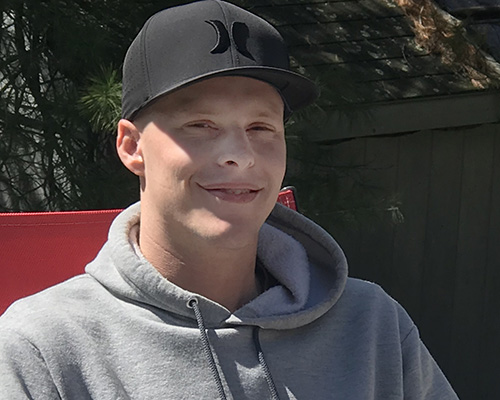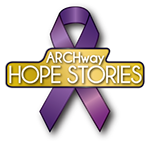Colton Baker
Stories of Hope
ARCHway believes in recovery from the disease of addiction.
An Advocate for Recovery
Colton Baker is a certified peer specialist with five years of sustained recovery.
Interviewed by Emily Jung
He works with ARCHway Institute, Recovery House, and the EPICC Project (Engaging Patients in Care Coordination) in order to help others struggling with the disease of addiction. Colton is an advocate for medically assisted treatment, transitional living, and peers with lived experience working in the field. He does numerous speaking engagements including trainings centered around the use of narcan and medically assisted treatment along with resource development. He is living proof that people can and do recover from substance use disorder.
 Growing up in the suburbs of St. Louis, Colton attended Lafayette High School where he excelled as both a student and athlete. He describes his life as pretty amazing, and he was fortunate to have two loving parents who were present for all of it. From an outsider’s perspective, his childhood seemed ideal.
Growing up in the suburbs of St. Louis, Colton attended Lafayette High School where he excelled as both a student and athlete. He describes his life as pretty amazing, and he was fortunate to have two loving parents who were present for all of it. From an outsider’s perspective, his childhood seemed ideal.
Colton believes that the underlying cause of his substance use disorder was undiagnosed mental illness, specifically depression and obsessive compulsive disorder (OCD). Colton isolated himself at times because of his depression, coming home from school with little energy or desire to do anything. He described his OCD as severe, when applied to many aspects of daily living, such as turning off lights and walking up stairs. Colton wasn’t able to identify these mental health needs and, he explains, it consumed him because he didn’t have the skills to cope with it.
“I was completely unaware of what mental health was and that what I was suffering from was that.”
Around the same time that Colton was dealing with his OCD and depression, he was introduced to alcohol. Alcohol brought him relief at the time. He finally felt comfortable instead of anxious. He felt energized and happy instead of depressed. He felt popular instead of isolated. Alcohol was his escape. In addition to lacking information about his mental health, he lacked knowledge of substance use and its effects as well.
Colton says, “I think if I would have been more educated on mental health and substance use from an early age and/or had taken it more seriously…a lot of what happened in later life could have been averted.”
Adolescents learn about substance use and mental illness from a variety of sources including school, family and friends, and the media. Not all are reliable sources. There is room to grow and work to ensure that they are getting the correct and honest information. Often adolescents are exposed to the affects of alcohol at an early age. Family members don’t have to be addicts to drink too much. We don’t realize how phrases like, ‘I need a glass of wine after the day I had,’ can impact our kids. Binge drinking is almost as normalized now as is the use of marijuana. Prescription opiates, heroin, fentanyl, and other recreational drugs are not hard to come by either, even in the suburbs of St. Louis where Colton grew up. Everyone knows someone that they can go to for drugs, and when curiosity strikes, adolescents are going to figure out a way to pursue it and be around it.
Colton’s mom did catch on to his OCD behaviors and, although he eventually learned to cope, he already had a taste of the relief that drugs and alcohol could bring him.
“No one…is going to live in either physical or emotional pain for extended periods of time,” Colton said, “I found a solution and unfortunately the solution I found was not a healthy one, even though at the time it was effective.”
From there, Colton pursued drugs and alcohol “vigorously,” as he put it, eventually leading him to heroin. It later caused him to drop out of Missouri State University. Colton talks about how his physical dependence on the drug kept him using. The thought of going through withdrawal was daunting. Additionally, Colton continued to struggle with his emotional and mental health. His use was accelerated when he lost his father to a heart attack in 2011. Colton was only 21 at the time.
At his worst, Colton would find himself contemplating suicide, leading him to treatment for the first time in 2013. He went to Centerpointe Hospital, where he was prescribed suboxone and went through their 21-day inpatient program. This worked for a few months until he began seeking out drugs again. On top of misusing his suboxone, Colton sought out another doctor who would prescribe him Xanax, which he abused along with other recreational drugs. Obviously something wasn’t working.
“The medication I was on was not suited to long term sobriety for me,” Colton said. In addition, he explains that he didn’t have the ancillary supports like transitional living and a social support network. These things would come later on.
A year later in 2014, Colton made his way back into treatment after crashing his car. His mom and aunt were there for him in the hospital, calling place after place trying to find a solution to his disease. But it was a long time friend who shook him enough to make a change. This friend told Colton that if he didn’t change something, he was walking away. He could no longer watch Colton spiral and throw his life away. This was a friend he had grown up with and roomed with for the first 2 years of college. The two, together, experimented with drugs and alcohol. The thought of losing more and more people pushed Colton to take the help that was out there for him.
In October of 2014, Colton went back into inpatient treatment at the Assisted Recovery Centers of America (ARCA). This was his first introduction to Vivitrol and to peer supports in the field, two aspects of his recovery he couldn’t have done it without.
After inpatient treatment, Colton immediately moved to Recovery House for transitional living. He believes that this is another key to true recovery. The peers he lived with at Recovery House would be the start of his new healthy social support network.
It’s important to surround oneself with positive supports. If those in recovery continue to hang around the same groups of people they did in active addiction, if they find themselves back in the same living conditions that they were using in, then they are going to relapse.
“Recovery house was a place where sobriety was modeled for the first time in a way that was attractive to me,” Colton explained. “I saw people that were my age that were doing well, that were happy, that were genuinely successful in sobriety.” For the first time, Colton wanted to pursue this lifestyle instead of the glimpses of relief he felt when using drugs and alcohol.
There were specific people who would have a profound impact on Colton’s recovery.
One of those people was John Stuckey. Colton explains that John has a demeanor that draws people to him. He said, “John talks a lot about pulling the best version of other people out and having those people pull the best version of him out.”
Colton realized it was no longer about what he could get, it was about what he could give to the next person. This would be what reintegrated Colton into society, what led him to the lifestyle he was always meant to have. He began to develop the skills, resources and the knowledge to help others achieve recovery as well.
As time progressed, Colton would get peer certified and hold an entry level position in the field at SEMO in Farmington, an inpatient facility. This is where he learned the basics of working in the field, including how to navigate EMRs, how to manage and run groups effectively, and how to provide peer support services and resources.
Colton Baker is truly an advocate. Colton is passionate about this field and about breaking down the barriers that are keeping people from getting better. His passion is illustrated in his words, his tone, and his demeanor. Colton said, “People can and do get better, but they are not going to with limited or no resources.”
- He talks about putting money in on the front end to help alleviate the problem. This means putting money towards prevention, treatment, medication, and housing.
- Colton believes that certified peer specialists are the key to long-term recovery, and that they could also play a major role in prevention programs for youths. These peers would not only have the knowledge and research to educate adolescents on the dangers and realities of substance use, but they would also have lived experience to share.
- Colton also believes that we must normalize seeking out mental health services, so they are looked upon in the same light as seeking out any other medical services. We need to allow young people to speak out about what is going on with them. We need to create safe places at school and in our homes for open and honest conversations.
Colton is not just a great advocate for the field, he is an advocate for his clients. He enjoys what he does and wouldn’t change it for the world. The more he works in the field, the more motivated he gets to support his clients, to break the stigma around substance use, and to lead the community to more education and inevitably change. “It’s like a snow-balling effect. The faster I go, the more the snowball picks up speed of motivation, energy, willingness, ability.” Colton added, “I’m not stopping,” and he means it!
People can and do recover if provided with the right resources. There is no one answer. If Colton would have given up after his first stay at Centerpointe and his first attempt at MAT with suboxone and if his family and friends hadn’t stood by his side, he wouldn’t be here today. Whereas undiagnosed mental illness and accessibility of drugs and alcohol were his recipe for a substance use disorder, his recipe for recovery was Vivitrol, Recovery House, and a social support network that modeled recovery in an attractive way.
Today, Colton gets to share what worked for him and help others find what works for them. He doesn’t give up. He believes in multiple chances. He is doing what he was put on this earth to do.
“It is this overwhelming feeling that I am exactly where I am supposed to be.” Colton added, “We will continue to grow and continue to work and we will achieve the mission statements that we have set out to achieve.”
Colton’s impact on the lives of others is endless because he models paying it forward. The people he helps achieve recovery are already and will continue to help others in similar situations. The long time friend of Colton’s who propelled him to recovery for the final time would show up later in his life. This time unfortunately, his friend was struggling with his own addiction. Colton, now successful in his recovery, had the resources and knowledge to help his friend. This is a clear sign of Colton’s purpose in this life. He is playing a bigger role than even he can fathom.
For more information about ARCHway Institute for Addictive Disease and Co-Existing Mental Health Disorders, contact:
ARCHway Institute for Addictive Diseases and Co-existing Mental Health Disorders
3941 Tamiami Trail Suite 3157-53, Punta Gorda, Florida 33950
Email: Emily.Jung@TheARCHwayInstitute.org
Phone: 314-635-8887
Website: https://TheArchwayInstitute.org/
Facebook: https://www.Facebook.com/TheArchwayinstitute/
Vimeo VOD: https://Vimeo.com/ondemand/archwaystoriesofhope

